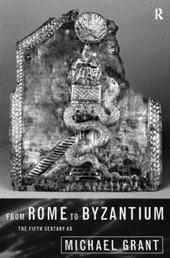
|
From Rome to Byzantium: Fifth Century AD
Hardback
Main Details
| Title |
From Rome to Byzantium: Fifth Century AD
|
| Authors and Contributors |
By (author) Michael Grant
|
| Physical Properties |
| Format:Hardback | | Pages:224 | | Dimensions(mm): Height 234,Width 156 |
|
| Category/Genre | Asian and Middle Eastern history |
|---|
| ISBN/Barcode |
9780415147538
|
| Classifications | Dewey:949.5013 |
|---|
| Audience | | Undergraduate | | Postgraduate, Research & Scholarly | |
|---|
| Illustrations |
illustrations, 46 b&w photographs, 6 maps
|
|
Publishing Details |
| Publisher |
Taylor & Francis Ltd
|
| Imprint |
Routledge
|
| Publication Date |
12 February 1998 |
| Publication Country |
United Kingdom
|
Description
The Byzantine Empire founded by Constantine as the seat of power in the East began to flourish in the fifth century AD, after the fall of Rome, yet its culture and history has been neglected by scholars in comparison to the privileging of interest in the Western and Roman Empire. Michael Grant's latest book aims to compensate for that neglect and to provide an insight into the nature of the Byzantine Empire in the fifth century, the prevalence of Christianity, the enormity and strangeness of the landscape of Asia Minor; and the history of invasion prior to the genesis of the empire. Michael Grant's narrative is lucid and colourful as always, lavishly illustrated with photographs and maps. He successfully provides an examination of a comparatively unexplored area and constructs the history of an empire which rivals the former richness and diversity of a now fallen Rome.
Reviews"Michael Grant is one of the most respected, and perhaps the most prolific, of historians of the ancient world. . . . [H]e now takes us into . . . the Roman and Byzantine empire of the fifth century, just before the fall of Rome. Grant seems a reliable guide to this world."
-"The Globe and Mail, July 1998
"Few classicists have written as prolifically as Michael Grant . . . As one might expect, Grant possesses a clear, expository style, a fund of wide learning, and a willingness to risk the disdain of his colleagues by aiming at a popular audience."
-"The Washington Post
"Grant's study ... is impressively erudite and characteristically well researched, and provides a fresh perspective on a century that was truly the best and worst of times."
-"Kirkus Reviews
"Michael Grant is one of our finest and most prolific writers on the ancient world."
-"Toronto Globe and Mail
"This provides a fine, accessible history of the period . . .."
-" The Bookwatch Grant possesses a clear expository style a fund of wide learning, 31 May 1998
Kirkus Review US:The great popular classical historian (Greek and Roman Historians, 1995; Constantine the Great, 1994; etc.) here meditates briefly on the century that saw the death agony of the Roman Empire and the birth pangs of the "new Rome" of the East, a civilization that would persist, against great odds, for almost a thousand years. Since before the age of Constantine the Great (c. 272-337 A.D.), the Roman Empire had been divided for administrative convenience into eastern and western halves. Constantine unified the empire, but his achievement was short-lived: After Theodosius I died, in 395 A.D., the two halves became permanently riven into eastern and western empires. The eastern empire, based in Constantine's old capital of Constantinople and held together by vigorous rulers, an all-powerful bureaucracy, and a vital citizen-army, repelled repeated barbarian invasions and gradually coalesced into the Byzantine Empire. Meanwhile, as Grant shows, the old locus of Roman imperium in the West quickly slid into desuetude: Alaric and his Visigoths sacked Rome in 410 A.D. Ganseric and the Vandals repeated this humiliation four decades later. By 476 A.D. petty principalities. Grant deftly sketches the distinctive cultural achievements of the early Byzantines in church architecture and in the visual arts; in literature, Grant points out, the Byzantines were not as accomplished as their western counterparts. In conclusion, Grant laments the sparse attention given the important eastern empire in historical scholarship and credits the Byzantines with the preservation of Western culture during Europe's Dark Ages. So brief as to seem superficial at points, Grant's study nonetheless is impressively erudite and characteristically well researched, and provides a fresh perspective on a century that was truly the best and worst of times. (Kirkus Reviews)
|